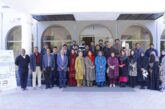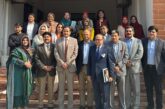
Peshawar: Like most contestants of the May 30th Local Government Elections, Shivram Sharma is out in the streets, knocking doors to ask for vote, pasting posters on walls. But while most other contestants represent the largely Muslim majority, Sharma’s hopes are hinged to support from the minority population in the Khyber Pakhtunkhwa province.
Sharma, 25, with his youthful looks and energy, is driven to leave a mark on this congested neighborhood in old city on election day. With other young men from his community who are equally excited about his chances, he is going around Karimpura asking a constituency of modest numbers – 60 Hindu and 10 Christian families – to vote for his equally modest election symbol: A jhompri or a hut.
And with the right credentials and unbounded determination, he might just win them over. Sharma has Masters in Business Administration (MBA) from IMSciences Peshawar – a leading business school that is often dubbed as the LUMS of Peshawar – something that most young men in his community can only aspire to.
“A majority of our community is poor and illiterate – they are unaware of importance of election and not interested in politics,” Sharma told News Lens Pakistan while pasting campaign posters in union council 15, ward 44, Karimpura, from where he will be contesting the elections.
Sharma is among the 349 minority representatives who, according to the Election Commission of Pakistan, will be contesting elections on 3339 minority seats in the local government elections. Increasingly, as urban and educated youth like Sharma turn to politics to solve the problems faced by minorities in Khyber Pakhtunkhwa, a majority of seats reserved for candidates belonging to religious minorities are going uncontested.
However, Sharma is facing tough competition from another Hindu and a Christian candidate for the Karimpura seat. Sharma says his inspiration for electoral politics came from his resolve to solve problems minorities face in narrow alleyways of old city where “lack of political awareness, education, poverty and fear is keeping them from political participation at grassroots level.”
According to the Election Commission of Pakistan, the Local Government Elections in Khyber Pakhtunkhwa that will take place on May 30, 2015 are aimed at devolving power to local leadership, increasing their efficiency and making municipal services work for the people.
Talking to News Lens Pakistan, All Pakistan Hindu Rights Movement Chairman Haroon Sarab Diyal said that the total population of non-Muslims in Khyber Pakhtunkhwa was nearly 1, 80,000, of which 125000 were Christians, 47000 Hindus, 15000 Sikhs, 4223 Kalash and other religious minorities.
Diyal gave two reasons for the minorities’ apathy towards politics: Illiteracy and the lack of political awareness among minorities.
“70 percent of non-Muslims belong to poor families with menial jobs such as sweeping or labor,” said Diyal. “Due to poverty and wrong policies of provincial governments, minority families do not pay much heed to education – their children do not attend school. There are no jobs except that of a sweeper’s for minority members in the government departments while in the entire KP, there is not a single minority teacher in government schools. According to the Constitution of Pakistan Article 20-A, 22-1 and 25-1, every citizen of Pakistan has the right to study his or her own faith but here in Pakistan, there is no separate curriculum for minorities to study religion.”
Diyal blamed political parties in Pakistan for not taking interest in the problems and progress of minorities. “No one cares about the challenges minorities face in Pakistan,” said Diyal.
He blamed the minority representatives in the national and provincial assemblies for the state minorities are in, saying they did not take interest in solving the problems of their own people and working for their uplift.
“There is no freedom of expression for minorities; they cannot speak openly for their rights,” said Diyal, adding that the educated members of their population kept a low profile fearing they may be targeted.
Minority leaders like Diyal accuse political parties of nepotism while awarding party tickets for contesting elections or giving it to those who are elected every time even when they work for their own people, not the community. He suggested that political parties should give party tickets to common people who work for the community.
Tariq Hayat, Manager Programs for Peace Education and Development Foundation, a training and advocacy organization working to secure the rights of ethnic and religious minorities said male and female representatives of minority groups must freely participate in the political sphere, public life and decision-making.
“Protection of minority rights can be best achieved and articulated through a combination of majority sensitivity and minority inclusion,” said Hayat.
Hayat said reasons behind the low or non-participation of minorities in local elections are complicated: “There are administrative, economic and social security issues which impede minority access to representation.”
“The minorities are often excluded from electoral reforms and constitution drafting because there is no proper representation of non-Muslims in the assemblies,” he said. “The non-Muslim members of the national and provincial assemblies are just representatives of their parties, not people.”
Hayat said the minority representatives were not there to address the issues and problems of minorities in their constituencies, nor were they accountable to them. He said beside awareness at the national and grassroots level, a complete overhaul in approaches and thinking of the political parties and minority communities is needed.
“Instead of empty slogans of change, the KP government should take adequate measures to ensure actual participation of marginalized communities in the decision-making processes,” said Hayat.
He said the government of KP was not prepared to carry out local government elections but was compelled by the Supreme Court of Pakistan to hold elections, which is why there was less time for relevant authorities to take effective measures all round to ensure participation from all.
Sohail Khan, Spokesperson for the Khyber Pakhtunkhwa Election Commission of Pakistan, said like Muslims, the non-Muslims were given the right to vote and elect their representatives. He said it was the responsibility of election commission to arrange elections for the people of Pakistan.
About minority’s seats, Khan said only 349 minority candidates would contest elections while the remaining seats would go uncontested. He said that after the May 30 elections, the Election Commission would again arrange for elections on the vacant seats. He said the elections would continue till all vacant seats go to minority representatives.
“This is a great opportunity for minorities to elect community representatives and resolve their problems on grassroots level,” said Khan. “It is unfortunate that due to lack of awareness, the minority people may miss this opportunity.”




